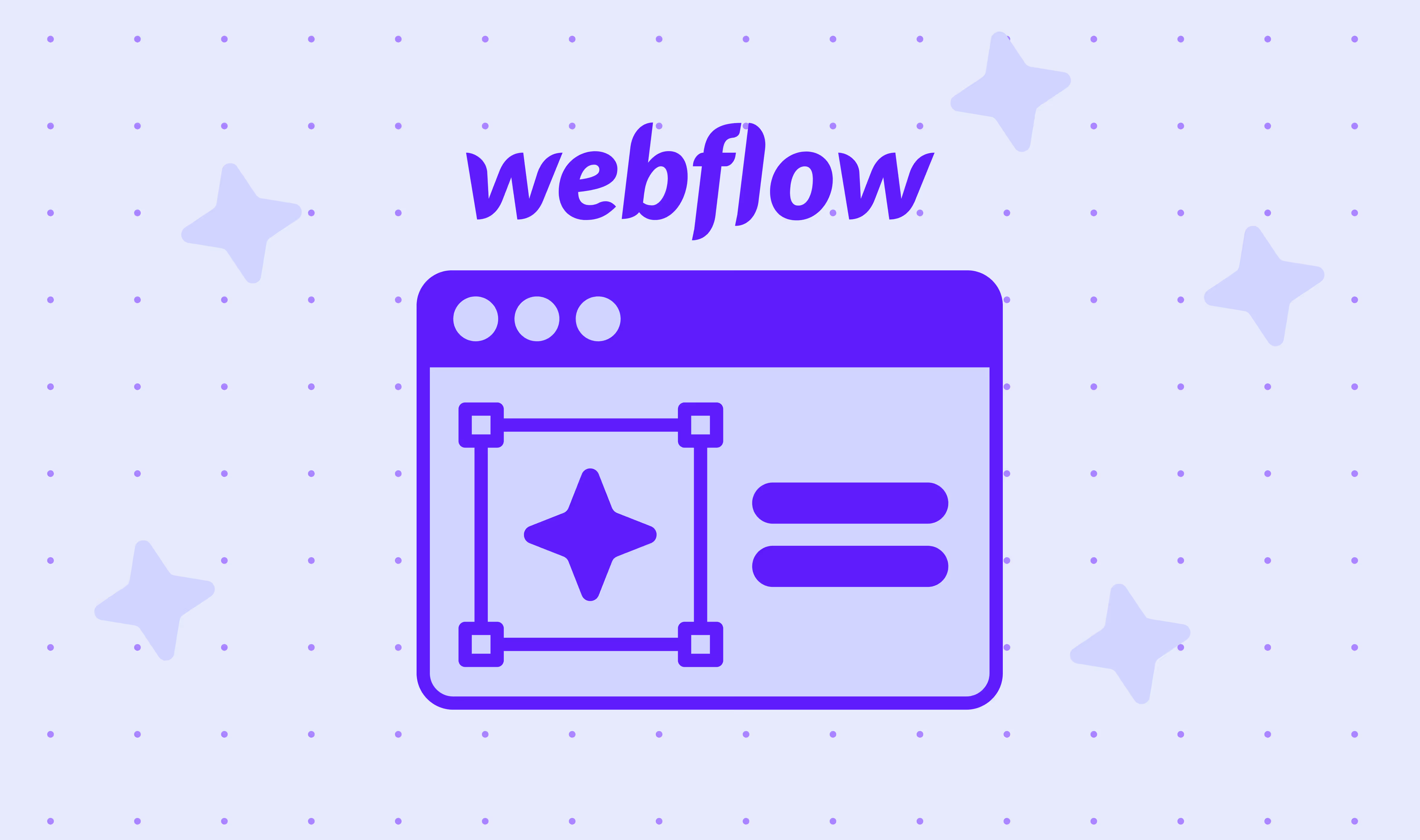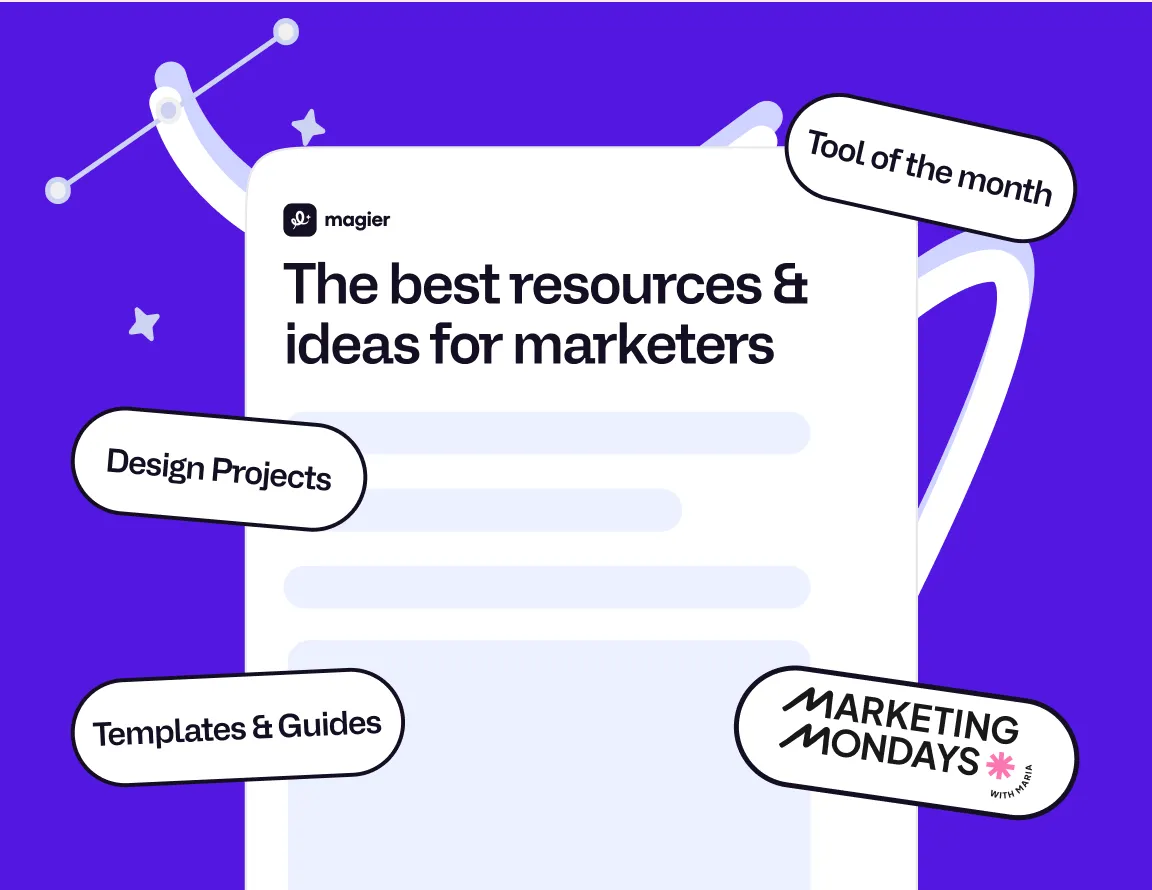

Autor
Veröffentlicht am
April 16, 2025
Lesedauer
5 min
Inhalt
H2
Teilen
Du suchst Design Hilfe?
Bei magier bekommst du all deine Design Aufgaben in einem monatlichen Abo.
Webflow for Marketers: A Step-by-Step Beginner's Guide (2025)
If you're a marketer working with Webflow — or thinking about switching from WordPress — this is the only guide you’ll need. Maybe your team’s already using Webflow. Maybe you’re setting up your very first site. Or maybe you’re just tired of pinging developers for every single content update.
Either way, this guide will break Webflow down into simple steps. By the end, you’ll know how to:
- Launch and update content without dev help
- Optimize your website for SEO
- Set up CMS for blog posts, testimonials, case studies, and more
- Integrate with tools like HubSpot, GA4, and Meta Pixel
Prefer to watch instead? Here’s the video guide:
What Is Webflow (And Why Marketers Love It)
Webflow is a visual, no-code website builder. You can design, build, and launch fully responsive websites — without writing a single line of code. Here’s why marketers (not just developers) love it:
- Visual Editing: See your changes instantly
- Autonomy: Update headlines, images, and blog posts without help
- SEO-Friendly: Edit meta descriptions, sitemaps, and OG images with ease
- Secure & Fast: No plugin updates or bugs like in WordPress
At magier, we run our own website on Webflow. It gives our marketing team full control — to publish content fast, test ideas, and skip the dev backlog completely.
Step 1: Understand the Two Sides of Webflow
There are two ways to use Webflow, and as a marketer, you’ll mainly use one.
Designer – This is where the website is built. Developers and designers work here.
Editor – This is where you’ll live. You can edit text, swap images, and publish new content without breaking anything.
Think of it as:
- Designer = construction zone
- Editor = content control panel
Step 2: Navigating the Webflow Dashboard
After logging in, you’ll see a dashboard with your projects.
This is where you manage:
- All your company websites
- Workspace settings (team, billing, integrations)
- Individual project settings (domain, SEO, forms, etc.)
Step 3: Publish Content Without a Developer
This is where Webflow really shines for marketers. Want to update an image? Swap a headline? Publish a blog post? You can do it all in the Editor, no code needed.
To edit existing content:
- Add
?edit=trueto your site URL - Click directly on any image or text
- Make your changes and hit “Publish”
To publish a new blog post:
- In the Editor, go to “Collections” → Blog
- Click “New Blog Post”
- Fill out the fields (title, author, image, body, SEO)
- Click Publish – done!
No design work needed. The layout is pre-built.
Step 4: Static vs Dynamic Pages — Know the Difference
Static pages (like "About Us" or "Pricing") are manually built and edited. They live in the Designer.
Dynamic pages pull content from the CMS — like blog posts, testimonials, job listings, or case studies. The layout stays the same, but the content changes depending on what’s added to the CMS.
Step 5: Managing CMS Collections (the Real Game-Changer)
The Webflow CMS is where you store repeatable content: blog posts, jobs, testimonials, case studies, lead magnets, and more. You’ll find “Collections” in both the Designer and the Editor. Pick the one you need, and you can:
- Add new content (with images, SEO, author fields, etc.)
- Edit existing content
- Publish or unpublish items instantly
How To Use It:
- Go to CMS tab in Designer or Editor
- Select a Collection (e.g. "Testimonials")
- Add or edit items
All new items will show up automatically on the front-end wherever that Collection is used.
Step 6: SEO in Webflow — No Plugin Required
Webflow has built-in SEO tools that make technical optimization simple.
For static pages:
- Open the page in Designer → Page settings
- Update:
- Title tag
- Meta description
- Open Graph title, description, image
- URL slug (with redirect option)
For CMS items:
- Edit SEO fields directly in the CMS form
- Add alt text to all images
- Customize slugs and titles easily
Step 7: Integrate Marketing Tools
You can easily connect Webflow with your favorite tools. No extra apps or plugins needed.
For global tools (e.g. GA4, HubSpot, Meta Pixel):
- Go to Project Settings → Custom Code
- Paste your script in
<head>or<body>
For page-specific tools:
- Add code to individual page settings
Popular integrations:
- HubSpot (native)
- Google Analytics 4
- Meta & TikTok Pixel
- Hotjar, Microsoft Clarity
- Tag Manager
Step 8: Image Management & Best Practices
- Upload through the Assets panel
- Use descriptive file names like
pricing-chart-2025.jpg - Add alt text for accessibility and SEO
- Resize to 1200x630px for optimal display
Write descriptive alt texts:
- “Webflow CMS for Marketers”
- “Marketing dashboard in Webflow”
- “Edit blog post in Webflow Editor”
Step 9: Publishing Updates
Once edits are done:
- Click Publish in the top right of the Editor or Designer
- Choose Staging (preview link) or Production (live site)
Tip: Always preview on staging before pushing to live.
Why Marketers Should Learn Webflow
If you’ve ever waited days for a developer to update one sentence on your homepage... you’ll love Webflow. It lets you:
- Publish content in minutes, not meetings
- Make updates yourself — no tickets, no backlogs
- Handle SEO basics without installing 12 plugins
- Move fast, test things, and actually stay ahead
We use it at magier every day — for our own site and for dozens of client projects. No matter if you’re switching from WordPress or starting from scratch, we’ve got your back.
Explore our Webflow services, including Wordpress to Webflow migrations.
FAQ: Common Webflow Questions from Marketers
1. Do I need to know how to code to use Webflow?
Nope. The Editor is completely no-code. If you're working with a designer or dev, they handle the Designer side.
2. Can I create landing pages by myself in Webflow?
Yes, if templates are set up in advance. Or we can help you build flexible landing page components.
3. Is Webflow good for SEO?
Yes. Title tags, meta descriptions, OG data, and alt text are all built-in. Plus it's fast and secure.
4. How do I integrate tools like HubSpot or GA4?
Use either the site settings (for global scripts) or individual page settings (for specific tools).
5. Can I update my website without breaking the layout?
As long as you're using the Editor or editing CMS content, yes. Just avoid changing layout classes in the Designer.
Magier Marketing &
Design Newsletter
Design Newsletter
Abonnieren unseren Newsletter und erhalten monatlich innovative Marketingstrategien, Designinspirationen und exklusive Tipps.




















